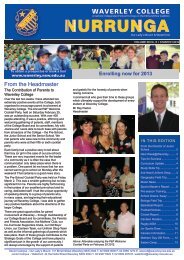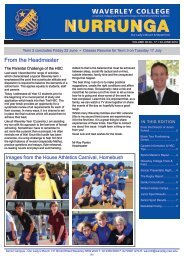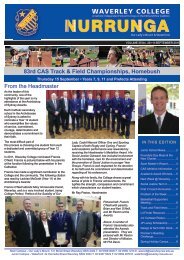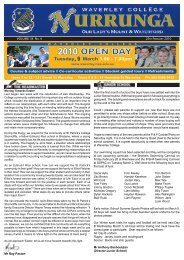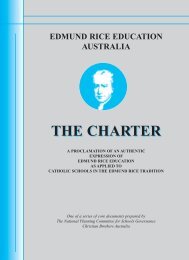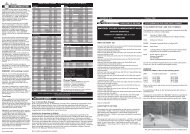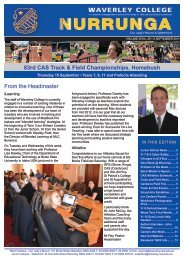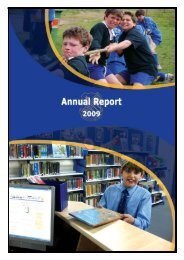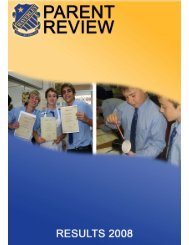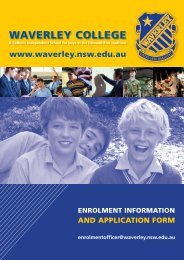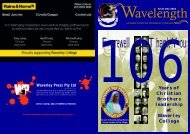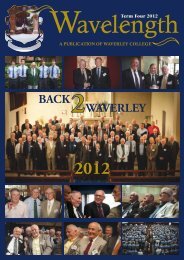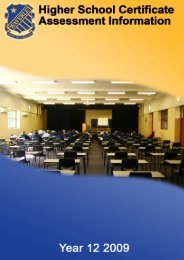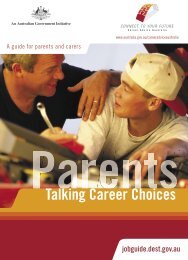Waverley College Annual Report 2008 (394KB)
Waverley College Annual Report 2008 (394KB)
Waverley College Annual Report 2008 (394KB)
You also want an ePaper? Increase the reach of your titles
YUMPU automatically turns print PDFs into web optimized ePapers that Google loves.
<strong>Waverley</strong> <strong>College</strong><br />
<strong>Annual</strong> <strong>Report</strong> <strong>2008</strong><br />
<strong>Waverley</strong> <strong>College</strong> is a Catholic independent boy’s school located in the Eastern Suburbs of Sydney<br />
operated in the tradition of Edmund Rice, founder of the Christian Brothers. The Stated Mission of<br />
the <strong>College</strong> is to create an environment where it is possible to foster the talents of all students in the<br />
context of faith. Our aim is the education of the whole person: spiritually, intellectually, emotionally,<br />
culturally, and physically. Further as a Catholic School we strive to communicate and maintain<br />
Christian and Catholic faith within the tradition of service in education established by Edmund Rice<br />
and continued by the Christian Brothers and their lay partners.<br />
<strong>Waverley</strong> <strong>College</strong> offers a comprehensive educational curriculum from Years 5 - 12 based on the<br />
New South Wales Board of Studies Syllabuses. In accordance with the Education Act 1990 (NSW)<br />
the <strong>College</strong> is a Registered and Accredited school where students are eligible for the School<br />
Certificate and Higher School Certificate. This registration expires at the conclusion of 2011.<br />
The <strong>College</strong> has a broad curriculum with a range of educational experiences available for student<br />
supported by contemporary facilities. The Learning Support Centre (LSC), encompassing Learning<br />
Support and Learning Enrichment programs, is designed to address student needs and extend boys<br />
using an integrated approach to learning. The Performing Arts Centre supports the growing numbers<br />
of students electing to complete Music and Drama. The <strong>College</strong> Gymnasium supports the extensive<br />
Physical Development and Health Education Program undertaken by the students both formally and<br />
informally. The introduction of the Vocational Education and Training courses in Stage 6 in<br />
Hospitality (Operations), Information Technology, Construction and Entertainment has ensured<br />
employment opportunities for boys once they complete school.<br />
The Professional Development of Staff and the provision of experiential learning for students are<br />
given high priority at the <strong>College</strong>. Access is given to staff for AIS, CEO and externally offered<br />
Professional Development courses and staff also has access to a Professional Incentive Scheme to<br />
encourage involvement and development beyond the classroom. Similarly, provisions are made<br />
within the <strong>College</strong> Calendar for each Faculty to provide students with experiences beyond the<br />
classroom through a range of excursions, field studies and performances.<br />
Throughout its curriculum, <strong>Waverley</strong> <strong>College</strong> is ever conscious that the <strong>College</strong> exists for the benefit<br />
of its students. Within a world of change and development the <strong>College</strong> accepts the challenges<br />
presented to any organization within this environment and is committed to the <strong>College</strong>'s tradition of<br />
providing quality education allowing each of its students to realise their full potential<br />
The <strong>College</strong> operates on two campuses. The Waterford campus, situated in Henrietta Street<br />
<strong>Waverley</strong>, operates as the Junior School for Years 5 & 6 boys and Pre-school for 2 – 5 year olds. The<br />
Senior Campus, Our Lady’s Mount in Birrell Street, operates as the Senior School for Years 7 – 12<br />
boys.<br />
Approximately 1334 boys from over 100 suburbs throughout Sydney are enrolled at the <strong>College</strong>. We<br />
have 101.5 academic staff, including counsellors, special education staff and a <strong>College</strong> Chaplain, plus<br />
22.8 Administration Staff and 12.4 Building Operations, Maintenance and other staff.<br />
<strong>Waverley</strong> <strong>College</strong> <strong>Annual</strong> <strong>Report</strong> <strong>2008</strong> 2
SCHOOL PERFORMANCE IN STATEWIDE TESTS AND EXAMINATIONS<br />
<strong>Waverley</strong> <strong>College</strong> Students took part in the following National and State Assessments, Tests and<br />
Examinations during <strong>2008</strong>:<br />
• National Assessment Program – Literacy and Numeracy (NAPLAN)<br />
o Year 5<br />
o Year 7<br />
o Year 9<br />
• Certificate Examinations for Year 10 in:<br />
o English Literacy<br />
o Mathematics<br />
o Science<br />
o Australian History, Geography, Civics & Citizenship<br />
o Computing Skills<br />
• Higher School Certificate for Year 12 in 35 Courses.<br />
The following graphs provide information on the performance of <strong>Waverley</strong> <strong>College</strong> students in these<br />
public assessments, tests and examinations in comparison to the cohort across the State of NSW.<br />
<strong>Waverley</strong> <strong>College</strong> <strong>Annual</strong> <strong>Report</strong> <strong>2008</strong> 3
The National Assessment Program – Literacy and Numeracy (NAPLAN)<br />
<strong>2008</strong> was the first year of the National Assessment Program – Literacy and Numeracy<br />
(NAPLAN). The program differed from past testing in that the tests are National and results<br />
are reported on a ten band scale, representing development form year 3 to year 9. Each year,<br />
6 of these bands are used to show student progress. The report shows a comparison of the<br />
student’s result to the national average for the year. The bottom band indicates a student is<br />
below the national minimum standard, and the second bottom band indicates the student is at<br />
the national minimum standard.<br />
The results of <strong>Waverley</strong> students show sound progress in the areas of literacy and numeracy.<br />
All three year levels tested showed results at least 10% above state average in Overall<br />
Literacy and Numeracy. Spelling results are consistently high: 17% to 20% above state<br />
average.<br />
In numeracy our results are strongest in number and data and patterns and algebra, with<br />
average results ranging from 17.1% above state average to 44.7% above state average.<br />
Maintaining high results in the areas of Measurement and Space has been a challenge for the<br />
boys.<br />
Details on school performance are provided in the following tables where band distributions<br />
and percentages of students achieving the national minimum standard are outlined separately<br />
for Year 5, Year 7 and Year 9.<br />
Year 5 band distributions and % of students at or above national minimum:<br />
Reading<br />
Writing<br />
Spelling<br />
Grammar &<br />
Punctuation<br />
Numeracy<br />
Band<br />
3 (-) %<br />
Band<br />
4 %<br />
Band<br />
5 %<br />
Band<br />
6 %<br />
Band<br />
7 %<br />
Band<br />
8 %<br />
<strong>Waverley</strong> 0 7 32 28 19 13<br />
National 8 11 25 23 18 15<br />
<strong>Waverley</strong> 0 5 16 47 26 7<br />
National 5 10 20 35 18 12<br />
<strong>Waverley</strong> 0 6 16 34 30 14<br />
National 6 10 19 28 25 12<br />
<strong>Waverley</strong> 1 10 20 29 23 17<br />
National 6 11 20 27 17 19<br />
<strong>Waverley</strong> 0 4 31 27 24 13<br />
National 5 15 27 26 15 11<br />
<strong>Waverley</strong> <strong>College</strong> <strong>Annual</strong> <strong>Report</strong> <strong>2008</strong> 4
Year 7 band distributions and % of students at or above national minimum:<br />
Band<br />
4 (-) %<br />
Band<br />
5 %<br />
Band<br />
6 %<br />
Band<br />
7 %<br />
Band<br />
8 %<br />
Band<br />
9 %<br />
Reading<br />
Writing<br />
Spelling<br />
Grammar &<br />
Punctuation<br />
Numeracy<br />
<strong>Waverley</strong> 1 4 17 38 30 9<br />
National 4 14 29 24 18 11<br />
<strong>Waverley</strong> 1 4 30 32 25 9<br />
National 7 11 30 24 19 10<br />
<strong>Waverley</strong> 1 4 19 39 29 9<br />
National 6 9 20 29 25 11<br />
<strong>Waverley</strong> 1 8 29 35 18 9<br />
National 7 14 23 25 20 10<br />
<strong>Waverley</strong> 0 4 14 26 30 26<br />
National 3 16 24 24 18 16<br />
Year 9 band distributions and % of students at or above national minimum:<br />
Band<br />
5 (-) %<br />
Band<br />
6 %<br />
Band<br />
7 %<br />
Band<br />
8 %<br />
Band<br />
9 %<br />
Band<br />
10 %<br />
Reading<br />
Writing<br />
Spelling<br />
Grammar &<br />
Punctuation<br />
Numeracy<br />
<strong>Waverley</strong> 6 17 24 26 26 6<br />
National 5 13 28 26 16 7<br />
<strong>Waverley</strong> 10 21 24 28 14 9<br />
National 8 17 23 25 12 9<br />
<strong>Waverley</strong> 9 11 25 31 22 8<br />
National 3 11 27 25 22 7<br />
<strong>Waverley</strong> 11 17 28 27 14 9<br />
National 7 16 29 21 12 10<br />
<strong>Waverley</strong> 5 19 22 31 19 13<br />
National 2 14 24 25 15 13<br />
<strong>Waverley</strong> <strong>College</strong> <strong>Annual</strong> <strong>Report</strong> <strong>2008</strong> 5
School Certificate Examinations <strong>2008</strong><br />
Year 10 students completed the School Certificate Examinations conducted in November<br />
<strong>2008</strong>. The Year 10 class of <strong>2008</strong> achieved overall good results in the School Certificate. The<br />
School Certificate Examinations are held in November in every secondary school in NSW,<br />
<strong>Waverley</strong> students were above the state average in English, Mathematics, Science, History<br />
and Geography. We look forward with confidence that students have established a firm<br />
foundation for their studies as they begin the final two years of secondary education.<br />
The graphs below compare the performance of <strong>Waverley</strong> <strong>College</strong> students against the performance of<br />
the State. <strong>Waverley</strong> students continue to achieve significantly better than the rest of the State.<br />
School Certificate Results 2007 – <strong>2008</strong>:<br />
<strong>2008</strong><br />
2007<br />
English<br />
Literacy<br />
Maths Science Civics<br />
Citizenship<br />
&<br />
Australian<br />
History<br />
Civics<br />
Citizenship<br />
&<br />
Australian<br />
History<br />
Computer<br />
Skills<br />
<strong>Waverley</strong> 78.47 73.44 75.97 75.48 77.11 80.37<br />
State 76.63 70.67 73.61 70.58 73.52 80.71<br />
<strong>Waverley</strong> 76.97 72.93 77.05 74.41 76.69 76.44<br />
State 74.76 69.38 73.48 72.14 74.60 80.28<br />
Explaining Bands: Band 6 requires a Mark of 90+; Band 5 a Mark of 80 – 89; Band 4 a<br />
Mark of 70 – 79; Band 3 a Mark of 60 – 69; Band 2 a Mark of 50 – 59; and Band 1 a Mark<br />
below 50.<br />
School Certificate <strong>2008</strong> - English<br />
60<br />
50<br />
40<br />
%<br />
30<br />
State<br />
School<br />
20<br />
10<br />
0<br />
Band 6 Band 5 Band 4 Band 3 Band 2 Band 1 None<br />
<strong>Waverley</strong> <strong>College</strong> <strong>Annual</strong> <strong>Report</strong> <strong>2008</strong> 6
School Certificate <strong>2008</strong> - Mathematics<br />
35<br />
30<br />
25<br />
%<br />
20<br />
15<br />
State<br />
School<br />
10<br />
5<br />
0<br />
Band 6 Band 5 Band 4 Band 3 Band 2 Band 1 None<br />
School Certificate <strong>2008</strong> - Science<br />
40<br />
35<br />
30<br />
%<br />
25<br />
20<br />
15<br />
10<br />
State<br />
School<br />
5<br />
0<br />
Band 6 Band 5 Band 4 Band 3 Band 2 Band 1 None<br />
<strong>Waverley</strong> <strong>College</strong> <strong>Annual</strong> <strong>Report</strong> <strong>2008</strong> 7
School Certificate <strong>2008</strong> - History<br />
40<br />
35<br />
30<br />
25<br />
% 20<br />
15<br />
State<br />
School<br />
10<br />
5<br />
0<br />
Band 6 Band 5 Band 4 Band 3 Band 2 Band 1 None<br />
School Certificate <strong>2008</strong> - Geography<br />
50<br />
45<br />
40<br />
35<br />
30<br />
% 25<br />
20<br />
State<br />
School<br />
15<br />
10<br />
5<br />
0<br />
Band 6 Band 5 Band 4 Band 3 Band 2 Band 1 None<br />
<strong>Waverley</strong> <strong>College</strong> <strong>Annual</strong> <strong>Report</strong> <strong>2008</strong> 8
Higher School Certificate <strong>2008</strong><br />
In the Sydney Morning Herald’s Honour Roll <strong>Waverley</strong> had 29 students listed for receiving<br />
Band 6 or E4. These students achieved 46 Band 6 or E4 for a number of their subjects.<br />
<strong>Waverley</strong> was also listed on the Sydney Morning Herald Honour Roll for Mathematics.<br />
One of the most pleasing aspects of the results was the performance of students across a<br />
range of Courses and the consistency of their results. The <strong>College</strong>’s highest UAI was 99.25<br />
and approximately 15 students received UAI’s above 90 and another 7 students received a<br />
UAI in the 87 to 89 range. Approximately 74% of HSC marks were above 70 (Bands 4, 5 or<br />
6). 21 of the 35 subjects received results above the state average and 21 of the 35 subjects<br />
had results in the Band 6 category. Considering <strong>Waverley</strong> does not exclude students on the<br />
basis of academic ability, these results would indicate <strong>Waverley</strong> students continue to perform<br />
very well against the rest of the state.<br />
The figures below indicate very few marks below 50 in any course. Below are the total numbers of<br />
bands awarded in all subjects.<br />
35 Band 6 (a mark of 90 or better)<br />
246 Band 5 (a mark between 80 – 89)<br />
369 Band 4 (a mark between 70 – 79)<br />
191 Band 3 (a mark between 60 – 69)<br />
42 Band 2 (a mark between 50 – 59)<br />
8 Band 1 (a mark below 50)<br />
A number of students also undertake Extension Courses. The Bands are allocated differently<br />
for these subjects. Below are the total numbers of bands awarded for Extension Courses.<br />
11 Band E4 (a mark of 45 – 50)<br />
36 Band E3 (a mark of 35 – 44)<br />
3 Band E2 (a mark of 25 – 34)<br />
0 Band E1 (a mark of 0 – 24)<br />
Explaining Bands<br />
HSC Bands are awarded to students based on the HSC Mark in each subject. The HSC Mark for a<br />
subject is the average of the Examination Mark and Moderated Assessment Mark. Band 6 requires a<br />
HSC Mark 90+; Band 5 a HSC Mark between 80 – 89; Band 4 a HSC Mark between 70 – 79; Band 3<br />
a HSC Mark between 60 – 69; Band 2 a HSC Mark between 50 – 59; and Band 1 a HSC Mark below<br />
50.<br />
<strong>Waverley</strong> <strong>College</strong> <strong>Annual</strong> <strong>Report</strong> <strong>2008</strong> 9
Below is a graph showing the changes in HSC Bands from 2003 to <strong>2008</strong>.<br />
Percentages of Bands 2003 - <strong>2008</strong> HSC<br />
40<br />
35<br />
30<br />
25<br />
% 20<br />
15<br />
10<br />
Band 6<br />
Band 5<br />
Band 4<br />
Band 3<br />
Band 2<br />
Band 1<br />
5<br />
0<br />
Yr 2003 Yr 2004 Yr 2005 Yr 2006 Yr 2007 Yr <strong>2008</strong><br />
Year<br />
<strong>Waverley</strong> <strong>College</strong> <strong>Annual</strong> <strong>Report</strong> <strong>2008</strong> 10
Post-School Destinations<br />
Of the one hundred and fifty four students who completed their HSC in <strong>2008</strong>. Approximately one<br />
hundred and ten students were offered places over a range of courses at universities in Sydney, the<br />
majority gaining entrance to the University of New South Wales and Sydney University. Other<br />
Universities that accepted several <strong>Waverley</strong> <strong>College</strong> students include Macquarie University,<br />
University of Technology, Australian Catholic University and Notre Dame University. A number of<br />
students also applied for positions at private <strong>College</strong>s.<br />
Approximately thirty students completed a pattern of study that did not allow them to apply for<br />
university entrance or they did not seek to continue with tertiary study. Many of these students<br />
obtained apprenticeships, entered small business such as real estate or other family businesses.<br />
TEACHER STANDARDS<br />
Teacher Qualifications<br />
107 teachers were employed at <strong>Waverley</strong> <strong>College</strong> to deliver Curriculum from Years 5 – 12. This<br />
includes temporary positions replacing teachers on Leave for periods longer than one school term. All<br />
but one teacher employed at <strong>Waverley</strong> <strong>College</strong> in <strong>2008</strong> held formal qualifications from higher<br />
education institutions within Australia or as recognised within the National Office of Overseas Skills<br />
Recognition guidelines.<br />
The majority (95%) of the teaching staff holds a bachelor degree as a minimum qualification. 30% of<br />
staff hold post-graduate qualifications. These degrees range across a number of disciplines.<br />
Qualification<br />
Qualification<br />
Total<br />
Individual’s<br />
Highest<br />
Qualification<br />
Certificate II 1 - 0<br />
Certificate IV 2 - 0<br />
Certificate 13 - 0<br />
Diploma 85 5 4.1<br />
Graduate Certificate 6 - 0<br />
Graduate Diploma 11 2 1.7<br />
Honorary Degree 1 - 0<br />
Bachelor Degree 99 72 63.4<br />
Bachelor Degree (Honours) 12 12 10.1<br />
Master Degree 29 21 17.9<br />
Doctoral Degree 3 3 2.8<br />
Professional Learning<br />
The <strong>College</strong> encouraged teaching staff to undertake ongoing professional learning throughout the<br />
year. Over $33,000 was dedicated in <strong>2008</strong> to professional development staffing beyond the five pupil<br />
free days within the <strong>College</strong> calendar annually. The breadth of these courses included subject specific<br />
inservicing, pedagogical development and network meetings to ensure currency with Board of Studies<br />
requirements.<br />
<strong>Waverley</strong> <strong>College</strong> <strong>Annual</strong> <strong>Report</strong> <strong>2008</strong> 11
Teacher Attendance & Retention<br />
At any one time there were eighty five teachers employed at <strong>Waverley</strong> <strong>College</strong> at the senior campus<br />
with another sixteen employed at the junior campus. Twelve staff changes took place during the <strong>2008</strong><br />
year, this included replacements for five staff on maternity leave, seven staff leaving to take up<br />
positions in other schools. Teacher attendance is an average of approximately 95%.<br />
STUDENT RETENTION RATES<br />
The enrolment at the date of the Census was 1334 students attended school at <strong>Waverley</strong> <strong>College</strong> in<br />
<strong>2008</strong>. During the year up to 38 students left the school. Reasons for these departures included family<br />
movement, students moving to another school or discipline issues. The departure of students in Years<br />
11 and 12 were primarily students entering the workforce or TAFE rather than moving schools. There<br />
were 33 new students enrolled at the <strong>College</strong> during <strong>2008</strong>.<br />
<strong>2008</strong><br />
Year<br />
5<br />
Year<br />
6<br />
Year<br />
7<br />
Year<br />
8<br />
Year<br />
9<br />
Year<br />
10<br />
Year<br />
11<br />
Year<br />
12<br />
Total<br />
Departures<br />
During Year<br />
New<br />
Enrolments<br />
During Year<br />
Enrolment at<br />
Census<br />
2 0 2 8 13 13 12 1 38<br />
12 1 1 6 7 0 5 1 33<br />
139 147 191 171 172 187 173 154 1334<br />
The average student attendance rate for <strong>2008</strong> was 95%.<br />
SATISFACTION<br />
(a) Staff:<br />
All new staff are given two day inductions to the <strong>College</strong> and are mentored for their first<br />
year. Professional development is actively encouraged and funded. The <strong>College</strong> provides a<br />
Staff Consultation Committee which is staffed by elected staff and regular staff meetings are<br />
held where the agenda is set by the staff.<br />
(b) Students:<br />
Each year group has a Student Representative Council and the Senior Prefects of the <strong>College</strong><br />
are given a prominent role. The small vertical home group structure at the <strong>College</strong> on a ratio<br />
of around 12 to 1 ensures that the students always have an avenue for expressing their<br />
satisfaction.<br />
(c) Parents:<br />
Parent/Teacher evenings are held for each year group from 5 to 12 at least twice each year.<br />
There are also information evenings held at least once a year for each year group with some<br />
years having two. Attendance at these information nights is usually between 90 and 95 per<br />
cent attendance. A weekly newsletter is sent to parents either electronically or in hard copy<br />
each week. Parent representatives are a part of the <strong>College</strong> Board. The <strong>College</strong> also supports<br />
the <strong>College</strong> P & F, Mothers Club, and most sports at the <strong>College</strong> have Parent Supporters<br />
Clubs which are run by the parents.<br />
<strong>Waverley</strong> <strong>College</strong> <strong>Annual</strong> <strong>Report</strong> <strong>2008</strong> 12
ENROLMENT POLICY & PROFILE<br />
<strong>Waverley</strong> <strong>College</strong> has a non-selective enrolment policy. Primary intakes are taken at Years 5 and 7.<br />
Limited places are available in other years dependent on total enrolments. Preference is given to<br />
Catholic students, students with siblings already attending the <strong>College</strong> and to sons of old boys.<br />
A member of the <strong>College</strong> Executive interviews all students applying to the <strong>College</strong> along with their<br />
parents prior to final acceptance.<br />
A reference is required from the Parish Priest, Minister of Religion or some other person in the<br />
Community; and a copy of the two most recent school reports must be provided. We also ask to see<br />
the Birth Certificate and Baptism Certificate.<br />
Once a child has enrolled at the <strong>College</strong>, parents become part of the Parents and Friends Association<br />
and the Mothers’ Club.<br />
All children of parents who are prepared to support the religious principles and ideals of this school<br />
are considered eligible for enrolment. The following group of applicants will however have a priority<br />
over others in admissions:<br />
• Members of the Catholic community;<br />
• Sons of Old Boys of the <strong>College</strong>;<br />
• Brothers of those who have attended or are attending the <strong>College</strong>;<br />
• Those who attended schools traditionally associated with entrance to <strong>Waverley</strong> <strong>College</strong> at<br />
that age.<br />
The Headmaster shall determine the Year of entry of a boy after appropriate consideration of the<br />
Board of Studies rules and the previous progress of the boy. Children of socially, culturally or<br />
financially disadvantaged families may receive special consideration.<br />
Applications and further information are available on the <strong>College</strong> Website:<br />
www.waverley.nsw.edu.au or from the <strong>College</strong> Enrolment Secretary.<br />
The Brother JP Lacey Scholarship<br />
Each year an examination is held at the <strong>College</strong> for Year Six students for the Br JP Lacey<br />
Scholarship. This Scholarship is awarded by the Old Boys' Union in memory of Br Lacey who was a<br />
memorable figure at <strong>Waverley</strong> for many years and Headmaster from 1948-1953. This examination is<br />
part of a Co-operative Scholarship Testing Programme organised by the Australian Council for<br />
Education Research Limited and is used by many schools as the means of their scholarship award.<br />
<strong>Waverley</strong> <strong>College</strong> <strong>Annual</strong> <strong>Report</strong> <strong>2008</strong> 13
STUDENT WELFARE<br />
Everyone in the school community is involved in pastoral care. A commitment to partnership and<br />
shared responsibility amongst staff, students, parents and other family members is an integral feature<br />
of pastoral care at <strong>Waverley</strong> <strong>College</strong>.<br />
While pastoral care initiatives respect the privacy of students’ lives, some students and their families<br />
actively seek the <strong>College</strong>’s support in times of crisis and instability. Within the limits of its resources<br />
and expertise, <strong>Waverley</strong> <strong>College</strong> is committed to the well being of its students.<br />
Pastoral care at <strong>Waverley</strong> <strong>College</strong> is vitally concerned with the fostering of student’s self-discipline.<br />
It aims to develop students who are responsible and inner directed, capable of choosing freely in<br />
conformity with their conscience. Pastoral care also contributes to students recognising that their<br />
fundamental freedoms and rights are reciprocated by responsibilities.<br />
Organisational Structures<br />
In the <strong>College</strong>’s daily and routine life, the way in which people interact with each other significantly<br />
affect each student’s sense of self worth, belonging and well being. The Home Group Teacher is the<br />
primary contact for the student’s spiritual, intellectual, emotional, cultural, and physical development<br />
over his six years in the Senior School. If a student is having a problem in class or with some<br />
misunderstanding of the subject then the class teacher should be the first point of contact; failing here,<br />
then the Head of Department. If the student has a disciplinary problem the Year Master is usually the<br />
contact. Yet in all this the Home Group Teachers will be involved and hold in their hands the longterm<br />
pastoral care of the student. The system provides continuity and consistency of care.<br />
The Role of the Home Group Teacher<br />
The Home Group consists of a teacher and usually two to three students from each of the six years<br />
within the <strong>College</strong>. The number of students in each group is approximately fourteen. The purpose of<br />
the Home Group is to provide for each student a family type group where a staff member individually<br />
knows them and relationships are fostered between different age levels. The Home Group Teacher is<br />
a significant adult in the lives of the students who provides them support, understanding and<br />
encouragement. Boys in a Home Group are vertically arranged with boys ranging from Year 7 to<br />
Year 12.<br />
The Home Group Teacher:<br />
• Will conduct ten-minute meetings five times a week.<br />
• Provides a Christian example and model by word and action.<br />
• Takes a personal interest in, helps, guides, directs and fosters the spiritual, intellectual,<br />
emotional, cultural, and physical development of their boys.<br />
• Fosters interpersonal relationships and communication between group members.<br />
• Oversees the students’ academic reports, and discusses any serious problems with students<br />
and their parents.<br />
• Works in partnership with class teachers, coaches and all who have dealings with a boy.<br />
The full text of this policy is provided to all new parents and students entering the <strong>College</strong>.<br />
Updated copies are available on the <strong>College</strong> website: http://www.waverley.nsw.edu.au/publications<br />
<strong>Waverley</strong> <strong>College</strong> <strong>Annual</strong> <strong>Report</strong> <strong>2008</strong> 14
DISCIPLINE POLICY<br />
The <strong>College</strong> Discipline Policy underwent a period of review during 2003. It was implemented in 2004<br />
and was well received by staff, students and parents. It ensures <strong>College</strong> expectations are made explicit<br />
and students are made aware of the consequences of their actions. Central to the Policy is the signing<br />
of the Student Agreement and Commitment that appears in the Student Diary. Students and parents<br />
sign this agreement when first enrolling and it is re-signed at the beginning of each academic year.<br />
The Student Diary outlines the <strong>College</strong> Policy, Rules and Regulations related to student discipline.<br />
Policies covering the following issues exist within the <strong>College</strong> Diary:<br />
• Homework<br />
• Entitlements & Responsibilities<br />
• Bullying<br />
• Haircuts & Uniform<br />
• Saturday Sport<br />
• Behaviour on Buses & Trains<br />
• Drug & Alcohol Policy<br />
Copies of these policies are available on the <strong>College</strong> website:<br />
http://www.waverley.nsw.edu.au/publications<br />
Preferred Practices of Teachers<br />
1. The School’s rules form the basis of all behaviour management and discipline<br />
This requires teachers to:<br />
• Teach the school rules in the context of their particular class<br />
• Determine and discuss regulations arising out of the rules<br />
• Establish a set of routines that must be adhered to: e.g. seating plan, line up outside the<br />
classroom, prayer, pick up all rubbish before leaving the room.<br />
• When correcting behaviour teachers will refer to ‘What rule was broken?’<br />
2. Use Positive Corrective Practice<br />
This requires teachers to:<br />
• Plan for managing expected difficulties<br />
• Use of least-to-most intrusive intervention<br />
• Focus is on the primary behaviour<br />
• Tell students what it is that they should be doing<br />
• Use encouragement, praise and rewards<br />
• Re-establish working relationships as soon as possible after correction<br />
3. Model, and expect Respect<br />
This requires teachers to:<br />
• Separate the behaviour from the person<br />
• Use of appropriate language<br />
• Use of private reprimands<br />
<strong>Waverley</strong> <strong>College</strong> <strong>Annual</strong> <strong>Report</strong> <strong>2008</strong> 15
DISCIPLINE POLICY<br />
4. Utilizing related and reasonable consequences<br />
This requires teachers to:<br />
• Regularly clarify consequences with students and apply them as necessary<br />
• Emphasize the relatedness of the outcome to the behaviour<br />
• Use consistency in application<br />
Staff Qualities & Key Values<br />
Informed by the Gospel & Edmund Rice values:<br />
• Respect for the individual<br />
• Tolerance<br />
• Academic integrity<br />
These are modelled in the following ways:<br />
• Language<br />
o Non-sexist<br />
o Not derogatory<br />
• Approach to Discipline<br />
o Clear & Consistent<br />
o Appropriate to boys<br />
o Understand diversity<br />
• Gender Modelling<br />
o Treat as individuals.<br />
o Manners and respect<br />
• Professionalism<br />
o Punctual<br />
o Supportive of <strong>College</strong> and colleagues<br />
o Appropriate dress<br />
• Problem Solving<br />
o Manage conflict<br />
o Conciliatory<br />
o Teamwork<br />
The full text of these policies and documents is available on the <strong>College</strong> website:<br />
http://www.waverley.nsw.edu.au<br />
<strong>Waverley</strong> <strong>College</strong> <strong>Annual</strong> <strong>Report</strong> <strong>2008</strong> 16
COMPLAINTS AND GRIEVANCE RESOLUTION<br />
The <strong>College</strong>’s policy for dealing with complaints and grievances includes processes for raising and<br />
responding to matters of concern identified by parents and/or students. These processes incorporate,<br />
as appropriate, principles of sensitivity, confidentiality and procedural fairness.<br />
The majority of concerns that arise from parents and/or students need never take the form of a formal<br />
complaint. The Headmaster, Executive, Middle Management staff and teachers are available to<br />
discuss and resolve concerns in more informal ways. Such lines of communication are clearly<br />
outlined in the <strong>College</strong> diary and at information sessions involving each year group every year. Each<br />
year group has a Student Representative Council as a means of communication between students and<br />
the <strong>College</strong>. Other avenues of communication include Home Group Teachers, Year Masters, Heads of<br />
Department (curriculum issues) and Executive members with specific areas of responsibility.<br />
Harassment Prevention Policy<br />
It is the responsibility of all staff to respect the rights of others and ensure that they do not become<br />
involved in or encourage harassment. Every staff member has the legal right to a work/study<br />
environment that is safe, and that is not sexually harassing, sexist, racist, anti-gay, anti-disability,<br />
ageist, or stereotyping in any other way.<br />
Staff must be careful not to do anything that could be interpreted as sexually harassing or stereotyping<br />
(putting down) people because of their race, sex, disability etc.<br />
Harassment Behaviours outlined in the extended policy have been used with permission from the<br />
University of Sydney’s ‘Staff and Student Equal Opportunity unit’ website.<br />
(http://www.usyd.edu.au/eeo)<br />
Staff have access to the full policy via the <strong>College</strong>’s Intranet site.<br />
RESPECT AND RESPONSIBILITY<br />
Both the <strong>College</strong>’s Mission Statement and Enrolment Understanding promote respect and<br />
responsibility. All students are taught to respect themselves and others, and celebrate the differences<br />
that exist within the <strong>College</strong> community.<br />
The Student Discipline Policy clearly indicates acceptable behaviour, and was reinforced by such<br />
initiatives as the anti-bullying program conducted since 2007. Service to others is at the core of the<br />
<strong>College</strong> community and is evident through the Year 11 Community Service Program, the Social<br />
Justice Group and the role of the Social Justice Co-ordinator throughout the <strong>College</strong>.<br />
<strong>Waverley</strong> <strong>College</strong> <strong>Annual</strong> <strong>Report</strong> <strong>2008</strong> 17
SCHOOL DETERMINED IMPROVEMENT TARGETS<br />
Strategic Plan 2007<br />
The <strong>College</strong> Board in consultation with the <strong>College</strong> Executive, teachers, students, parents and<br />
members of the broader school community, including the Old Boys Union reviewed the success of<br />
the previous Strategic Plan and undertook a new Strategic Plan.<br />
This Strategic Plan identifies three key areas with various sub headings for development over the<br />
next five years:<br />
1. Governance and Stewardship<br />
• Governance<br />
• Communication<br />
• Financial Management<br />
• Managing Ricks<br />
2. <strong>College</strong> Ethos<br />
• The <strong>Waverley</strong> <strong>College</strong> Culture<br />
3. Curriculum and Teaching Practice<br />
• The Learning environment<br />
• Student Needs<br />
• Teaching Practice<br />
• Curriculum Development<br />
This Strategic Plan continues to be developed prior to full publication. It aims to prepare the <strong>College</strong><br />
Board members to be formed in the Edmund Rice tradition enabling the Trustees to delegate higher<br />
levels of responsibility. The upgrading of the <strong>College</strong> facilities is seen a continuing priority to ensure<br />
the ability of teachers to deliver curriculum most effectively.<br />
The Strategic Plan was finalised by mid 2007 for the broader <strong>College</strong> community to view and access.<br />
<strong>Waverley</strong> <strong>College</strong> <strong>Annual</strong> <strong>Report</strong> <strong>2008</strong> 18
FINANCIAL INFORMATION<br />
The summary of income and expenditure is presented in graphical form aggregated from financial<br />
information that is provided annually to the Commonwealth.<br />
Total Income: $21,452,909<br />
Total Expenditure: $20,923,878<br />
Commonw ealth<br />
recurrent<br />
grants<br />
29%<br />
State recurrent<br />
grants<br />
13%<br />
Governm ent<br />
Capital Grants<br />
0%<br />
Income<br />
Other Capital<br />
Income<br />
2%<br />
Fees & Private<br />
Income<br />
56%<br />
Capital<br />
Expenditure<br />
11%<br />
Non-Salary<br />
expenses<br />
29%<br />
Expenditure<br />
Salaries,<br />
allow ances &<br />
related<br />
expenses<br />
60%<br />
Br P A Leary cfc<br />
HEADMASTER<br />
June 2009<br />
<strong>Waverley</strong> <strong>College</strong> <strong>Annual</strong> <strong>Report</strong> <strong>2008</strong> 19



